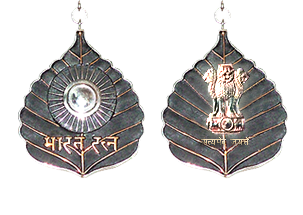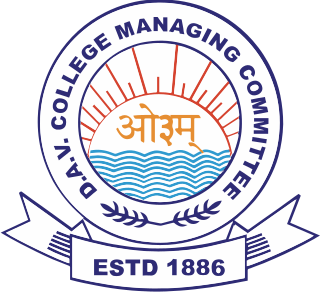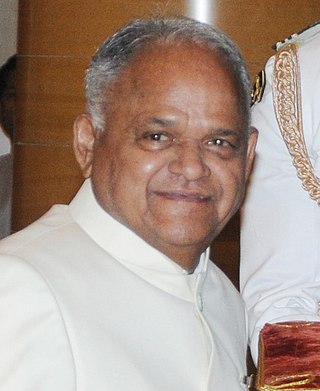
The Bharat Ratna is the highest civilian award of the Republic of India. Instituted on 2 January 1954, the award is conferred in recognition of "exceptional service/performance of the highest order", without distinction of race, occupation, position or gender. The award was originally limited to achievements in the arts, literature, science, and public services, but the Government of India expanded the criteria to include "any field of human endeavor" in December 2011. The recommendations for the award are made by the Prime Minister to the President. The recipients receive a Sanad (certificate) signed by the President and a peepal leaf-shaped medallion with no monetary grant associated with the award. Bharat Ratna recipients rank seventh in the Indian order of precedence.
The Padma Bhushan is the third-highest civilian award in the Republic of India, preceded by the Bharat Ratna and the Padma Vibhushan and followed by the Padma Shri. Instituted on 2 January 1954, the award is given for "distinguished service of a high order...without distinction of race, occupation, position or sex." The award criteria include "service in any field including service rendered by Government servants" including doctors and scientists, but exclude those working with the public sector undertakings. As of 2020, the award has been bestowed on 1270 individuals, including twenty-four posthumous and ninety-seven non-citizen recipients.

Elattuvalapil Sreedharan is an Indian engineer and politician from the Indian state of Kerala. He is credited with changing the face of public transport in India with his leadership in building the Konkan Railway and the Delhi Metro while he served as the managing director of Delhi Metro Rail Corporation (DMRC) between 1995 and 2012. Known as the Metro Man, he was awarded the Padma Shri by the Government of India in 2001, the Padma Vibhushan in 2008, the Chevalier de la Legion of Honour in 2005 by the Government of France and was named one of Asia's Heroes by Time magazine in 2003. Sreedharan was appointed by the former UN Secretary General Ban Ki-moon to serve on the United Nations's High Level Advisory Group on Sustainable Transport (HLAG-ST) for a period of three years in 2015. He is a member of Mata Vaishno Devi Shrine Board. He briefly served as a national executive council member of Bharatiya Janata Party, but later quit active politics in December 2021. He also worked as an advisor of Dhaka Metro authority which is called Dhaka Mass Transit Company Limited under the Railway Ministry of Bangladesh.

The Indian honours system is the system of awards given to individuals for a variety of services to the Republic of India. The categories of awards are as follows:

The D.A.V. College Managing Committee, familiarly known as DAVCMC, is a non-governmental educational organisation in India and overseas with over 900 schools, 75 colleges and a university. It is based on the ideals of Dayananda Saraswati and Arya Samaj. The Dayanand Anglo-Vedic (DAV) education system also comprises colleges offering graduates and post-graduates degrees in areas of study all over India.
Mahatama Hansraj, was an Indian educationist and a follower of Arya Samaj movement founder, Swami Dayanand. He founded, with Gurudatta Vidhyarthi, the Dayanand Anglo-Vedic Schools System (D.A.V.) in Lahore on 1 June 1886, where the first D.A.V. school was set up in memory of Dayanand who had died three years earlier.

Vijay Kumar Chopra is the chief executive officer and editor in chief of the Punjab Kesari print news organisation. He is involved in social welfare work and has received a Padma Shri award. In August 2009, he was elected by the Chairman of the Press Trust of India.
Raj Ratna was a title of high honour, a civilian award, which was prevalent in the princely states of India during the British Raj.

DAV College, Abohar is a post graduate college in the city of Abohar, Punjab, India. It is spread over 20 acres of land on Hanumangarh Road.

Vinod Prakash Sharma was an Indian malariologist and entomologist, known for his work in vector biology and bioenvironmental control of malaria. Recipient of many awards, including the Padma Shri, he was again honoured by the Government of India, in 2014, by bestowing on him the third highest civilian award, the Padma Bhushan.
Anil Bordia was an Indian educationist, social activist and former civil servant, widely respected for his contributions to the Indian education sector. The Government of India honoured him, in 2010, with Padma Bhushan, the third highest civilian award, for his services to the fields of education and literature on education.
Uma Tuli is an Indian social worker, educationist and the founder of Amar Jyoti Charitable Trust, a Delhi-based non-governmental organisation, working for the rehabilitation of physically disabled people. She was honoured by the Government of India, in 2012, with the fourth highest Indian civilian award of Padma Shri.
Pavagada Venkata Indiresan (1928–2013) was an Indian engineer, educationist, and administrator. He served as Director of the Indian Institute of Technology (IIT) in Madras during 1979-1984. He was professor at IIT Delhi during 1965-1979 and 1987-1993.

Meenakshi Gopinath is an Indian educationist, political scientist, writer and a former principal of Lady Shri Ram College, New Delhi. She is the founder and incumbent director of the Women in Security Conflict Management and Peace (WISCOMP), a non governmental organization promoting peace and socio-political leadership among the women of South Asia and a former member of the National Security Advisory Board, the first woman to serve the Government of India agency. She has served as a member of the selection panel of the Lokpal, a legal body which has jurisdiction over the legislators and government officials of India. The Government of India awarded her the fourth highest civilian honour of the Padma Shri, in 2007, for her contributions to Indian educational sector. She is a co-editor of the International Feminist Journal of Politics, the leading journal of feminist international relations and global politics.
Acharya Vishva Bandhu was an Indian Vedic scholar, writer, educationist and the principal of Dayanand Brahma Mahavidyalaya, an institution under the management of D. A. V. College Trust and Management Society. He was best known for his contributions in fostering Vishveshvaranand Vishwa Bandhu Institute of Sanskrit and Indological Studies, an Indological institution founded by two sanyasins, Vishveshvaranand and Nityanand, in 1903. He served as the director of the institution and also contributed to the establishment of Lal Chand Research Library of DAV College, Chandigarh. He was the editor of Vedic Texto-Linguistic Studies and A Vedic Word Concordance, two treatises dealing with the textual and linguistic aspects of the Vedas. The Government of India awarded him the third highest civilian honour of the Padma Bhushan, in 1968, for his contributions to Indian education.

J. S. Rajput is an Indian educationist, writer and the former director of the National Council of Educational Research and Training. After his stint as a professor at the Regional Institute of Education, Bhopal during 1974–77, he served as the principal of the institution till 1988 when he was appointed as Joint Adviser on Education to the Ministry of Human Resource Development, a post he held till 1994. When the National Council for Teacher Education (NCTE) was established in 1994, he was made the founder chairman of the council where he served until his move in 1999 to the National Council of Educational Research and Training (NCERT) as its director. He superannuated from service in 2004 and during his tenure as the head of NCERT, it was reported that he brought in regulations in BEd education by distance education method and introduced a two-year BEd course.







